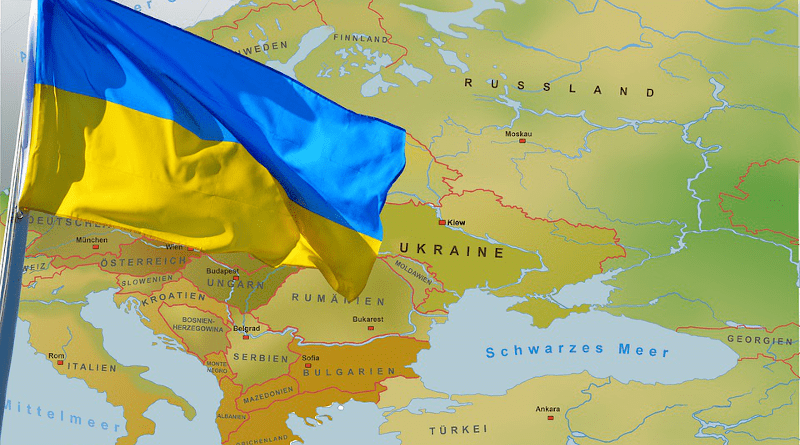Ukraine’s Resilience In Face Of Ongoing Conflict: Navigating Challenges And Shaping The Future – OpEd
In the wake of over a year of international armed conflict in Ukraine, the nation finds itself grappling with the aftermath of devastation and uncertainties that have seeped into every facet of its existence. Millions have been uprooted from their homes, unable to return, while those who remain wrestle with the harsh realities of life under dire circumstances—scarce access to essential services such as water, heat, and healthcare.
The psychological toll of this prolonged crisis has also been undeniable, affecting individuals both within and beyond the country’s borders. In response to this pressing humanitarian emergency, the International Federation of Red Cross (IFRC) has embarked on an Emergency Appeal initiative, working in collaboration with the Ukrainian Red Cross and other National Societies to provide critical aid that not only addresses immediate needs but also lays the groundwork for long-term recovery.
The departure of the Hong Kong-flagged merchant ship Joseph Schulte from the port of Odesa is emblematic of both hope and uncertainty in Ukraine’s current landscape. Having remained trapped in port since Russia’s full-scale invasion in early 2022, the ship’s departure carries implications that extend beyond its journey. However, doubts loom over how Russia might respond to this move, underscoring the complexity of diplomatic maneuvering in the region. Against this backdrop, Ukraine’s establishment of a “humanitarian corridor” within the Black Sea assumes significance beyond its literal interpretation. Recent reports of Russian airstrikes damaging grain storage facilities in Reni compound the challenges faced by Ukraine, with ramifications for its stability and the broader global economy. (1)
The ongoing counteroffensive led by Ukraine against Russian forces represents a new chapter in this prolonged struggle. The conflict’s evolution is marked by the vastness of the front line—a daunting stretch of over 600 miles—and the intricate network of defensive fortifications erected by Russian forces. As initial hopes for rapid shifts in the conflict’s trajectory diminish, military experts caution against expecting swift victories. The arduous journey ahead necessitates sustained commitment and strategic finesse from Ukraine and its international allies. The crux of the counteroffensive lies in reclaiming lost territory and asserting sovereignty, themes that reverberate not just within the borders of Ukraine but across the global geopolitical landscape.
Amidst the formidable challenges posed by entrenched Russian defenses, the counteroffensive’s pace of progress appears measured. The landscape painted by Russian fortifications—complete with minefields and trenches—serves as a stark reminder of the uphill battle Ukrainian forces face. Yet, the imperative of achieving even modest advancements carries profound significance. These advances serve as a testament to the indomitable spirit of a nation unwilling to concede and as a means of garnering ongoing support from Western allies. The uncertainty surrounding the conflict’s resolution remains, offering a spectrum of potential outcomes that transcend borders and influence international dynamics.
Ukraine’s steadfast allies continue to stand alongside the nation, acknowledging the broader implications of the conflict. The intertwined geopolitical stakes of the struggle between Russia and Ukraine reflect not merely regional tensions but the global contours of power dynamics. As the narrative unfolds, the pursuit of sovereignty and security in Ukraine acquires a universal dimension, underlining the interconnectedness of nations in an increasingly interdependent world.
Ukraine’s ongoing battle is more than just a regional conflict; it serves as a microcosm of the intricate challenges faced by nations contending with upheaval and change. The potential end to the conflict between Russia and Ukraine is multifaceted and influenced by various geopolitical, military, and diplomatic factors. While predicting a definitive outcome is challenging, several potential scenarios could unfold:
Negotiated Settlement: Diplomatic efforts, possibly through international mediation, could lead to an agreement outlining terms for ceasefire, territorial adjustments, and a stable political framework. Concessions from both sides would be required for a lasting peace.
Frozen Conflict: The conflict could reach a stalemate, resembling other frozen conflicts globally. Russia and Ukraine might agree to halt hostilities without clear resolution, resulting in tension, occasional violence, and ongoing diplomatic efforts.
International Intervention: Coordinated international action, potentially under the United Nations, could deploy peacekeeping forces to stabilize the situation. Buffer zones, securing key areas, and mediation could help facilitate negotiations.
Gradual De-escalation: Over time, Russia and Ukraine could decide to reduce hostilities and work towards normalized relations. This process might involve withdrawing forces, confidence-building measures, and bilateral negotiations.
Continued Escalation: The conflict could escalate further, causing increased suffering, economic devastation, and heightened international tensions. This could lead to more involvement from other global powers, complicating the situation.
Regime Change: Leadership changes in Russia or Ukraine could reshape the conflict’s dynamics. New leaders might approach negotiations differently, introducing uncertainties into the situation.
Unilateral Withdrawal: One party might decide to withdraw from the conflict due to internal or external pressures, resulting in a cessation of hostilities. However, this might not address underlying issues and could leave certain aspects unresolved.
Ultimately, the end to the conflict will depend on the willingness of both Russia and Ukraine to find a resolution that balances their interests, the engagement of the international community in facilitating negotiations, and the evolving geopolitical landscape. Given the complexities of the situation, a combination of diplomatic efforts, strategic maneuvering, and compromises will likely be required to bring about a sustainable and peaceful resolution.
- Oliver Slow, “Ukraine war: Ship leaves Odesa despite Russia Black Sea attack fears”, BBC News, 16 August, 2023 https://www.bbc.com/news/world-europe-66518504 .

